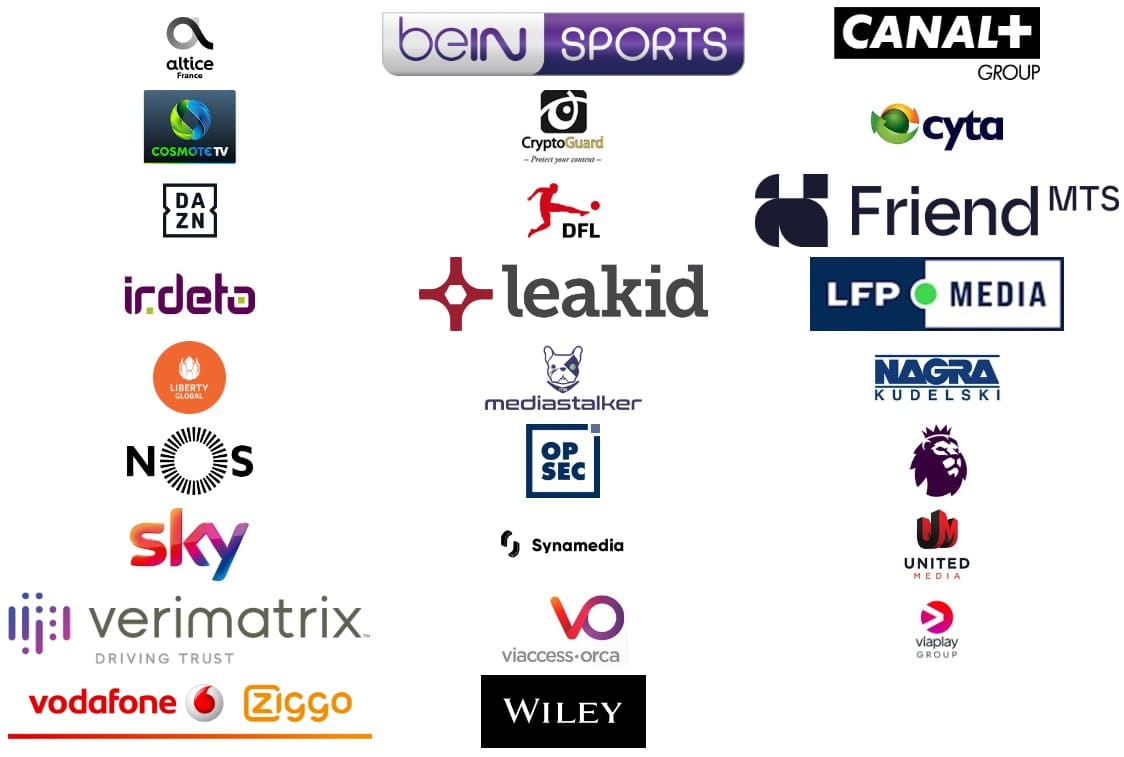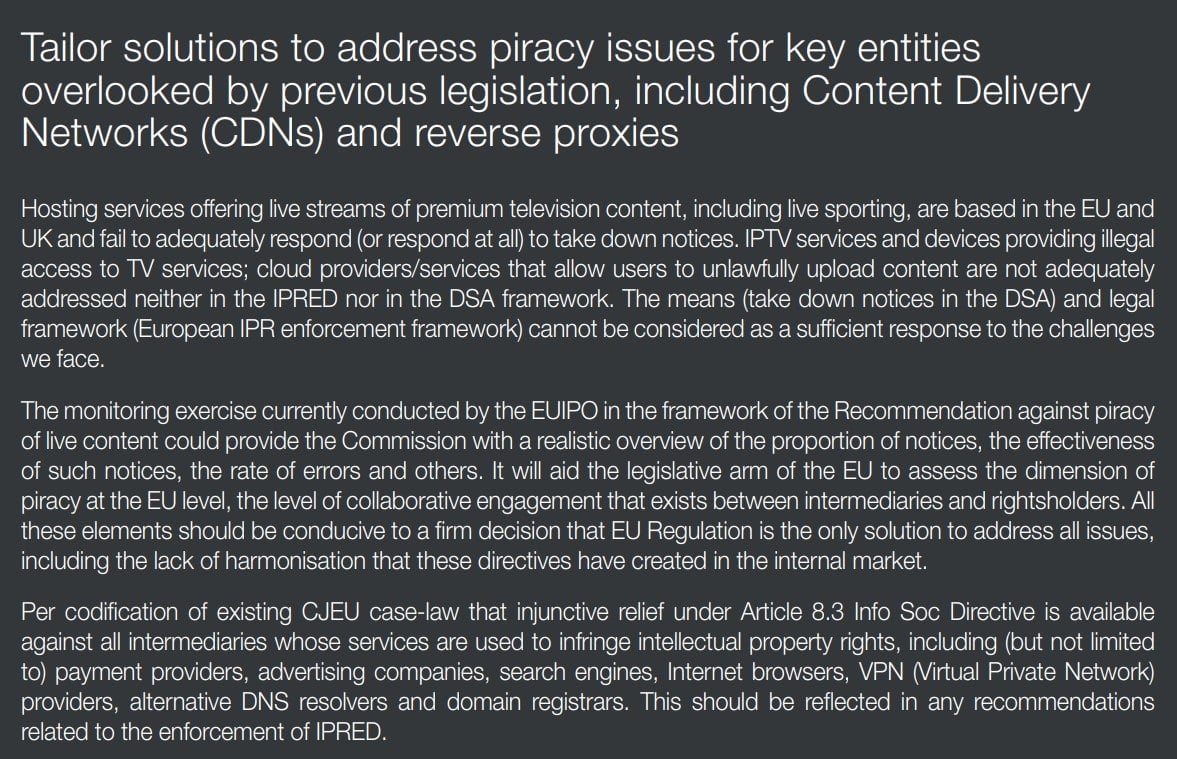The Audiovisual Anti-Piracy Alliance (AAPA) has released its 2025-2029 manifesto, requesting the EU to enable stronger anti-piracy protections. Most suggested improvements are targeted at combating live-streaming piracy. They include near instant takedowns as well as broader site blocking injunctions, which AAPA would like to expand to VPNs and web browsers.
In recent years, the European Commission has proposed and adopted various legislative changes to help combat online piracy.
They include the Copyright Directive which passed in 2019 and the Digital Services Act (DSA), which followed not long after.
These measures have been spurred on by major copyright holders, who have long called for stricter enforcement of pirated content online. At the same time, there are continued calls for additional legislation, particularly in respect of live-streaming events, including sports.
Last year, The European Commission adopted a recommendation to combat online piracy of sports and other live events. This non-binding measure encourages member states to take action against illegal live-streaming. According to many rightsholders, however, that’s not enough.
AAPA Demands Action
The legislative process in the EU is complex and according to the Audiovisual Anti-Piracy Alliance (AAPA), time is running out. The European anti-piracy group, whose members include Sky, BT, Irdeto, the Premier League, LaLiga, Viaplay, Wiley, and Vodafone, has just released a new manifesto in which it calls for concrete measures.

AAPA Members
AAPA’s Executive Director, Miruna Herovanu, says that it’s time for EU lawmakers to make a change, so online piracy and the associated criminal networks can be properly dealt with.
“After years of laying the groundwork to combat online piracy it’s time for EU policymakers and beyond to fully acknowledge that decisive, targeted measures are needed at the European level. The rise of digital theft demands action,” Herovanu says.
“We call for strong political resolve to end the theft of our members’ content. We’re ready to support every stakeholder—law enforcement, policymakers, and industry representatives—to dismantle criminal networks and protect European consumers from harm.”
2025-2029 Manifesto
In its manifesto, AAPA advocates for stronger protections for audiovisual content, including live sports and other events. The group outlines their policy priorities for 2024-2029, which includes five main points:
– Introduce innovative data-driven legislation to combat live content piracy in 2025.
– Promote the enforcement and expansion of the Digital Services Act to ensure that what is illegal offline is illegal online.
– Harmonize EU-level protection for audiovisual content to enable robust investment in original content and grassroots sports.
– Expand the reach of legislation to address piracy facilitated and engaged in by key intermediaries, including Content Delivery Networks (CDNs) and reverse proxies.
– Continuing to represent a unified voice on anti-piracy for intermediaries willing to engage towards the betterment of the online environment.
The most broad suggestion calls on the EU to propose new legislation that builds on insights it received though the DSA, while also implementing some of the key measures from its earlier recommendation to combat live-streaming piracy.
This new framework should be specifically targeted at the characteristics of live-streaming piracy. That includes near-instant takedowns of allegedly infringing content.
“The European Commission should propose legislation which ensures near immediate take down of live content, at the latest in November 2025, at the end of the data-collection exercise jointly run by the EU Intellectual Property Office and European Commission.
“Such an approach would further enhance the EU’s capability to effectively combat online piracy and protect both content creators and consumers,” the manifesto adds.
Expanding the Anti-Piracy Toolbox
The other key points also focus on optimizing anti-piracy capabilities. For example, by expanding the DSA to include robust ‘Know Your Business Customer’ requirements. That should help to identify operators of pirate sites and services.
In addition, more rightsholders should be allowed to act as “trusted flaggers” under the DSA. At the same time, the takedown notices of these trusted flaggers should be followed up “near immediate”, instead of “with priority”, as it is now.
In another recommendation, AAPA specifically mentions shortcomings related to hosting companies, who often don’t respond properly to takedown notices. The manifesto does not specify how AAPA would like this addressed, but the shortcoming isn’t limited to services that store content.

From the manifesto
AAPA also includes Content Delivery Networks (CDNs) and reverse proxies. This includes Cloudflare, which is used by many pirate sites, although the US-based company isn’t specifically mentioned.
Expanding Site Blocking to VPNs and Internet Browsers
The hosting and CDN comments begin with mentions of general shortcomings related to takedown notices. Two paragraphs later, however, there’s a rather broad call to expand site blocking measures, far beyond regular Internet providers.
In essence, AAPA would like to formally expand the current ‘site blocking’ injunctions to search engines, VPNs, DNS resolvers, domain registrars, and even Internet browsers.
“Per codification of existing CJEU case-law that injunctive relief under Article 8.3 Info Soc Directive is available against all intermediaries whose services are used to infringe intellectual property rights, including (but not limited to) payment providers, advertising companies, search engines, Internet browsers, VPN (Virtual Private Network) providers, alternative DNS resolvers and domain registrars.”
The suggestion is quite broad, but several of these recommendations are already in play. For example. Cloudflare has been ordered to block pirate sites in the EU, and the same applies to DNS resolvers. Meanwhile, Google, payment providers and advertising services block pirate sites though voluntary initiatives.
Earlier this week, Italy also approved legislation that requires VPNs to block pirated content, so that’s no longer a novelty either.
Officially codifying the extension of these measures to other intermediaries, including web browsers, follows this trend. If it’s up to the AAPA, Europe will formally write this into law, so that future injunctions can target Chrome, Firefox, Safari, Edge, Brave, and others.
Whether any of these recommendations will be followed up has yet to be seen, but the 2025-2029 manifesto, which is available here, gives a good idea of where major rightsholders will focus their policy lobbying efforts in the years to come.
RIP Matrix | Farewell my friend ![]()
Hope you enjoyed this news post.
Thank you for appreciating my time and effort posting news every day for many years.
2023: Over 5,800 news posts | 2024 (till end of September): 4,292 news posts
- Asciito
-

 1
1



3175x175(CURRENT).thumb.jpg.b05acc060982b36f5891ba728e6d953c.jpg)
Recommended Comments
There are no comments to display.
Join the conversation
You can post now and register later. If you have an account, sign in now to post with your account.
Note: Your post will require moderator approval before it will be visible.